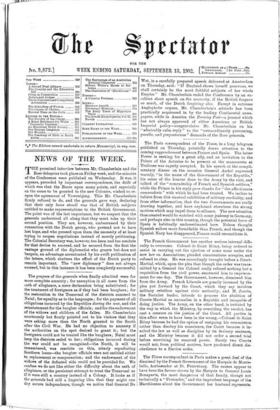The prayers of the generals when finally admitted were for
more complete amnesty ; for exemption in all cases from the oath of allegiance, a mere declaration being substituted ; for the treatment of foreigners as if they had been burghers ; for the restoration to the Transvaal of the districts annexed to Natal; for equality as to the languages ; for the payment of all obligations incurred by the Republics during the war, and the reinstatement for the burgher officials ; and for the endowment of the widows and children of the fallen. Mr. Chamberlain courteously but firmly pointed out to his visitors that they were asking more than the North granted to the South after the Civil War. He had no objection to amnesty if the authorities on the spot desired to grant it ; but the foreigners could not be treated like the burghers; Natal must keep the districts ceded to her ; obligations incurred during the war could not be recognised—the North, it will be remembered, was resolute on this, utterly repudiating Southern loans—the burgher officials were not entitled either to replacement or compensation; and the endowment of the widows of the defeated side could not be provided for. We confess we do not like either the difficulty about the oath of allegiance, or the persistent attempt to treat the Transvaal as if it were still a country instead of a Colony. It looks as if the generals had still a lingering idea that they might one day secure independence, though we notice that General De Wet, in a carefully prepared speech delivered at Amsterdam on Thursday, said: "If England shows herself generous, we shall certainly be the most faithful subjects of her whole Empire." Mr. Chamberlain ended the Conference by an ex- cellent short speech on the necessity, if the British forgave so much, of the Dutch forgiving also. Except in extreme Anglophobe organs, Mr. Chamberlain's attitude has been practically acquiesced in by the leading Continental news- papers, while in America the Evening Post—a journal which has not always approved of either American or British Imperial policy—congratulates Mr. Chamberlain on his "admirably calm reply" to the "extraordinarily presuming, puerile, and preposterous" demands of the Boer generals.






































